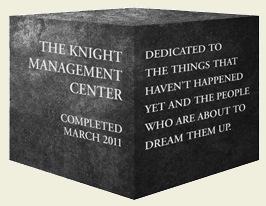I spent a few minutes today catching up with the Stanford GSB Dean’s “State of the School, Fall 2010” message, which anticipates the GSB’s move into the new Knight Management Center in Spring 2011.
What caught my attention, from an MBA admissions perspective, is the inscription on the new cornerstone of the new center. How is that for clarity in what Stanford GSB is looking for? Dreaming up — and presumably then building — new things is, literally, the cornerstone of the institution.
So if you are applying to Stanford GSB, you need to have some idea of what (ambitious) business or organization or innovation you may dream up, why it’s important to the world, why you are the person to do it, why SGSB can expect you to succeed, and a sense of how they can help you.
Is this saying, “think small?” Is this saying, “comfortable career track?” “Sure, we want to educate you so you can be a trader in an I-bank, or telecoms strategy consultant…?” I think not. They are not demanding mainline entrepreneurship exactly, but they are demanding those ready, willing, and able to build big new things in the world.
It’s also worth spending the 4 minutes it takes to watch Dean Saloner’s presentation, below, because he integrates key elements in the business school education framework, from perspective to foundations to critical-analytical thinking to innovation to personal leadership in a very joined-up way. As an applicant, it’s worth pausing to think how this simple pattern can be used to structure stories and events in your own life that you are trying to tell Adcom about.
.

